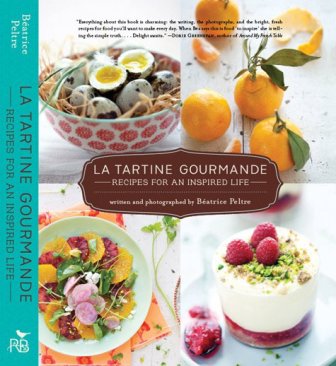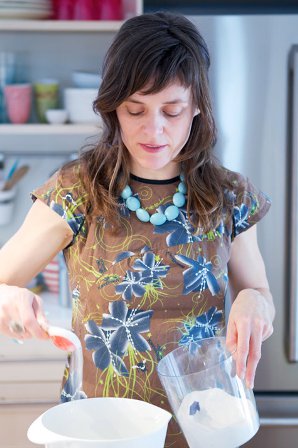I generally like French food more than gluten-free, but that's not saying much. I rarely crave traditional French fare, but when I do, it's usually a cheese-encrusted bowl of French onion soup. As for gluten-free recipes, I've never been tempted to try the ones my Facebook friends post. Probably because the cardboard-tasting gluten-free foods I've sampled over the years leave so much to be desired.
So imagine my surprise when I fell head over heels for a new French gluten-free cookbook. Truth be told, before I laid eyes on Béatrice Peltre's gorgeous new cookbook, La Tartine Gourmande, I fell truly, madly, deeply for her book trailer.

In fact, watching Peltre transform simple, farm-fresh ingredients into pretty little dishes did for me what I help clients with eating issues do -- discover anew the joy of cooking, eating and living. Exactly why I fell so hard is hard to say, but it was probably some combination of the musicality of Peltre's French accent, the still-life artistry of her kitchen, and the innocence of her adorable sous chef Lulu. That's her 3-year old daughter.
Whatever it was, the 3-minute video left me wanting more than a copy of the La Tartine Gourmande. It left me wanting to break bread with the award-winning food blogger turned cookbook author.
If you're craving a translator, let me satisfy that craving. "Tartine" is a French open-faced sandwich. "Gourmande" is synonymous with gourmet. If you're wondering how a tartine lover came to embrace gluten-free cooking, hold that thought. First things first: While this petite foodie from the countryside of northeastern France is happy to share her views on why French women don't get fat, her main interest in compiling more than 100 of her favorite recipes in La Tartine Gourmande is to invite readers to share the simple pleasures of a life with food at the heart of it.
Like I said, I was hoping to break bread, or at least enjoy a latte, with this multi-talented French expatriate who lives a few towns from me. Unfortunately, the crazy-busy schedule of this cook, writer, food stylist, photographer and newish mom would only permit a phone meeting. What follows are questions and answers from our recent tête-à-tête, plus one of Peltre's delicious, nutritious gluten-free recipes.

Q. Watching your book trailer, I was struck by your joie de vivre for cooking, eating and living. Where does that come from?
A. It comes from my family in France. My mother was always cooking. People were always stopping by for meals. We were always celebrating food, not just on special occasions, but at every meal.
Q. How do you maintain that joy in America, where the majority are either too busy to cook and/or so fixated on weight, they're afraid to let themselves enjoy eating?
A. I never really had a problem having this culture of food here. Once you have that [love of food] inside you, you can bring it everywhere you go. You come to the states and you have this idea there are bad eating habits, but they're actually in every country. It's not specific to the U.S. It's just a question of how do you look at food. What is your way of thinking about it?
Q. I love your quote: "Dessert is to a meal what a dress is to a woman." Tell me about dessert in your life.
A. When you have a nice meal, it's a nice idea to have a treat. I don't treat it as the last dessert I'll ever have. I don't have more than I need. The way I look at it: I love to make desserts. Even when we do not have fancy desserts, my husband and I, we always want at least a piece of dark chocolate or a nice bowl of fruit, just a little tiny something to nibble on after a meal.
Q. Is it true what they say about French women -- that they don't get fat?
A. It might be true, it might not. I once read a study between the way a French person and a North American would react in front of a chocolate cake. The French would be like, "Wow, that's so yummy!" Americans would be: "Ooh, ooh. I can't have that. I'm going to put weight on." The French indulge, but reasonably. A little bit of everything every day, it's never going to hurt you. Everything in moderation. It's a formula that works because no one likes to feel unwell from eating too much. We all have weaknesses with food. I say that because, in certain situations, I know I eat too much, and it's not a nice feeling.
Q. How do you understand why Americans are getting fatter and fatter?
A. People cook less, or they use more processed foods or they're not educated about having a balanced diet. I don't want to be critical, but I've worked in offices with women and they were not eating anything. All they wanted to eat for lunch is salad. I'm thinking: "How do you survive, just salad?" Of course, if you're not eating lunch now, at some point during the day, you're going to compensate with poor snacking habits or having too much food at dinner. I'm not a medical doctor, but unless there's an underlying serious medical condition, [I don't think it's] possible to make yourself so fat unless there's a bad food disorder, or you're eating the wrong things, or eating too often or you're not eating properly at meals.
Q. How do you maintain a healthy weight in America, land of the super-sized portions and abundant junk food?
A. If I feel like I'm one to two pounds heavier, I feel it right away, and I get back on track. Unfortunately, a lot of people just don't look at food as a friend, as a source of enjoyment. They're always thinking: "It's going to be bad for me" or, "How am I going to be able to put on a swimming suit?" If you look at food a different way -- eat everything you like, but just what you need -- you can embrace it. You can have a very happy relationship with it.
Q. American children are notoriously picky eaters. Why do you think that is?
A. Parents give in too quickly. It's important if a child refuses food once, you should not give up. You should try again. My own daughter says "no" to certain things, and it's hard for me, too. But no child, unless there's a real condition, is going to let herself starve. Eventually she'll eat when she's hungry. Lulu, she's very tall, very strong, very robust. If she says "no" to food, that's OK. She eats very well at the next meal. It's a challenge. It's not something I win every time, but I'm ready to make the effort, make food interesting for her. [Like the time Lulu said she didn't like black rice until I molded it into the shape of a teddy-bear face.] In the end, I want to develop good eating habits in her.
Q. Despite your life-long love affair with tartines, most of your recipes are gluten-free. Why is that?
A. My recipes are gluten-free because that's the way I cook and eat. Seven years ago, I went to a Peru and came back with parasites. It was really pretty bad. The tests weren't showing celiac disease, but they showed I'm predisposed to gluten intolerance. I decided to go on a gluten-free diet, and I felt so much better, I decided to stay on the diet. The adjustment was hard, but I'm really enjoying it. There's still a stigma that gluten-free doesn't taste good. When friends come over for dinner, I don't warn them. I just treat it as normal food that happens to be gluten-free. It tastes just as nice.
Q. Anything else I didn't ask that you might want to add?
A. The key thing and why I wanted to write this book is to create a nice feeling about food. I really enjoy cooking. My mom isn't someone who expressed her love a lot with words. She gave her love with food and making meals. I know I'm following in her footsteps. I always love to make people happy with food. My idea is to celebrate everyday meals. It doesn't need to be complicated. It doesn't need to be a big production. For me, food is about the enjoyment, the happy feeling, the sharing feeling.
---
Interested in cultivating the happy, sharing feeling? Try Peltre's gluten-free variation on tabouli, the popular Middle Eastern salad.
Beet and quinoa tabouli
Serves 4 to 6
2 tablespoons pine nuts
1 cup (200 g; 7 oz) uncooked white quinoa
2 cups (475 ml) water or vegetable broth
Sea salt
1 large cooked beet, peeled and diced
1 cup mixed cherry tomatoes, cut in half
¼ red onion, finely chopped
3 oz (90 g) feta cheese, crumbled
For the vinaigrette:
Sea salt and pepper
Juice of 1 lemon or lime
6 tablespoons olive oil
2 tablespoons chopped flat-leaf parsley
1 tablespoon chopped cilantro
1 tablespoon chopped chives
1 tablespoon chopped mint
Toast the pine nuts in a frying pan over medium heat for two minutes, or until lightly colored and fragrant; remove from the heat and set aside to cool.
Rinse the quinoa under cold water and drain it in a colander. Add it to a pot and cover with the water or broth and a pinch of sea salt. Bring to a boil, then turn down the heat, cover, and simmer for 12 to 14 minutes, or until all of the water or broth is absorbed. Remove from the heat and keep covered for five more minutes. Transfer the quinoa to a bowl and fluff it with a fork; let cool. Add the beet and toss gently. The quinoa will take on a nice pink color. Add the tomatoes, onion, and cheese.
To prepare the vinaigrette: In a small bowl, combine the sea salt and pepper with the lemon juice and oil, and whisk to emulsify. Stir in the herbs. Dress the salad with this vinaigrette and adjust the seasoning to your taste. Add more dressing if you like and serve with the pine nuts.
Book jacket photos by Béatrice Peltre
Author photo by Philip Jacob
Jean Fain is a Harvard Medical School-affiliated psychotherapist specializing in eating issues, and the author of "The Self-Compassion Diet." For more information, see www.jeanfain.com. Got comments on any of the above? Share your two cents in the Comments section.
For more by Jean Fain, L.I.C.S.W., M.S.W., click here.
For more on healthy cooking, click here.